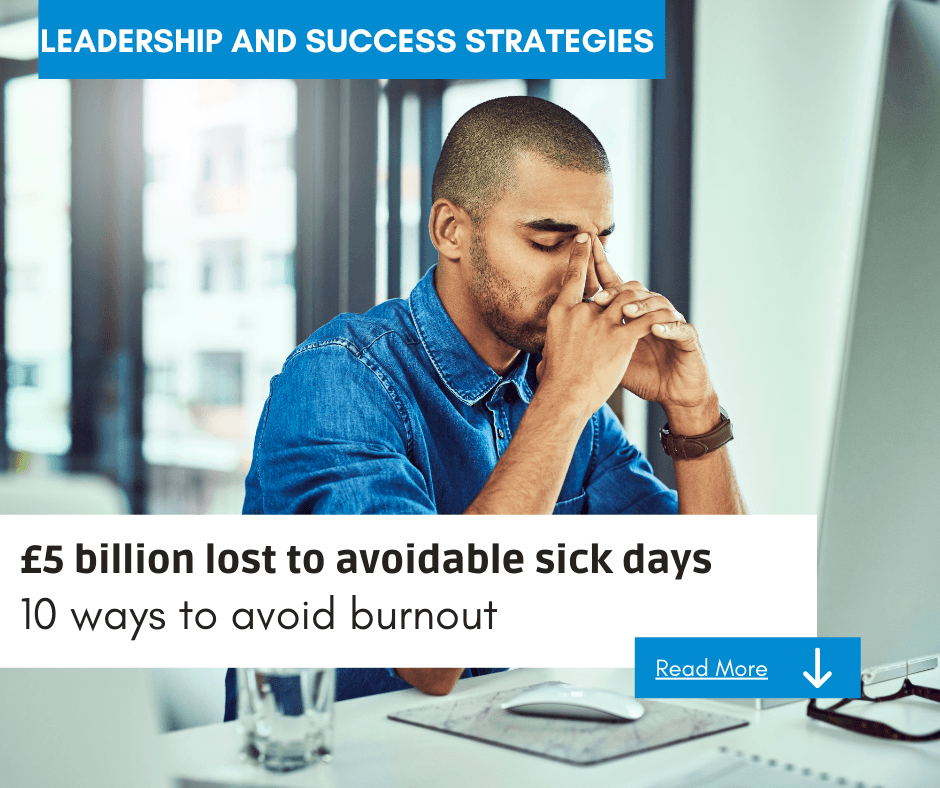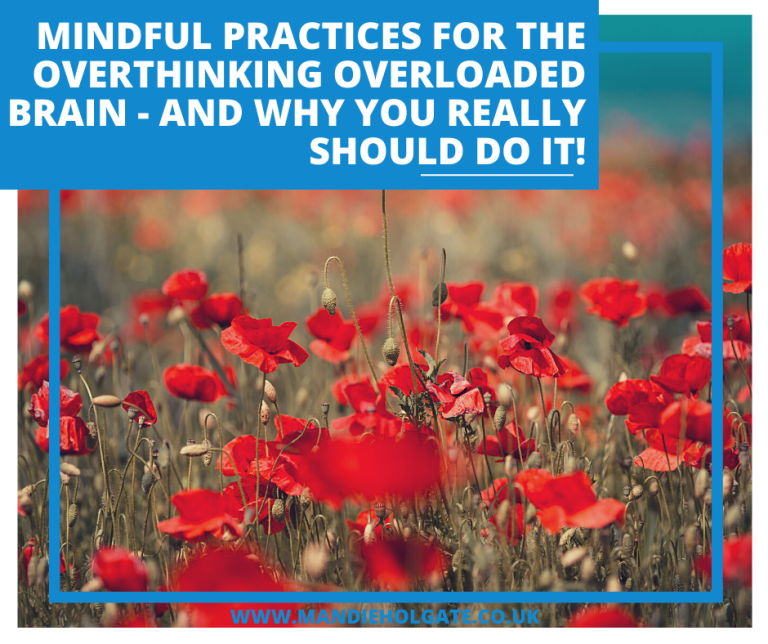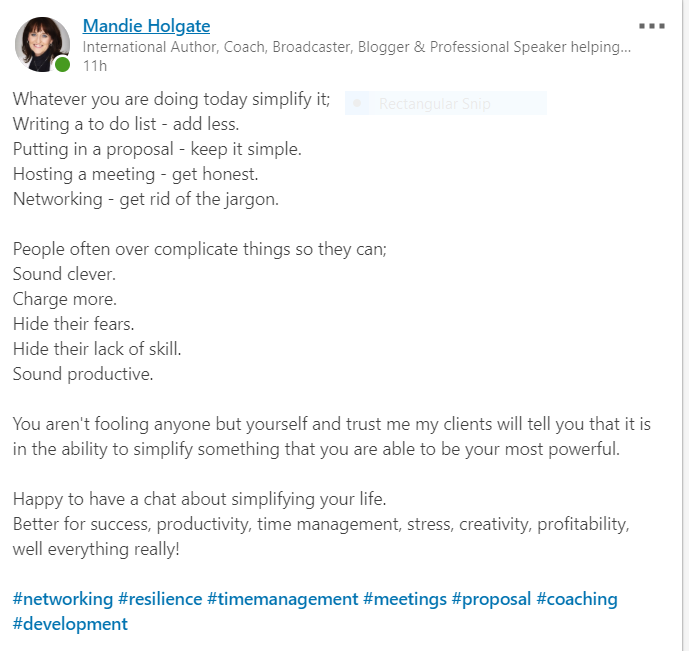£5 billion in avoidable sick days – 10 ways to avoid the true cost of burnout
According to Indeed (1) burnout is on the rise with 80% of those asked saying Covid had made burnout worse.
The cost to business is around £5 billion with 43% of all sick days in the UK alone due to burnout.
In business it is likely to cause;
- Absenteeism.
- Mistakes.
- Disgruntled staff.
- Poorly performing teams.
- Reduced productivity and even damage profitability and innovation in business.
Here are 10 strategies to fight overwhelm, overload and overworking for you and your team. They are all taken from my unique style of coaching that can deliver results for teams within 3 hours. I’m happy to talk you through these strategies and share more – get in touch here.
1. Create a communications policy for your company
I’ve created over 40 communication policies this year for teams and each has been unique. They have included things like “No email to be sent after 1pm on a Friday” this stops the “get it off of my desk mentality” and improves communication and team relationships. Or having an agreed green, red, orange system for subject line – green – for your information no need to reply, orange – you may need to be involved, please review and reply as necessary, red – urgent please respond within 4 hours. Agree on a policy and then communicate it, ensuring you reflect and review 6 weeks later to see what is working and what needs to change. You will be surprised how many in your team do not know when it’s okay to walk into your office or to phone you because the conversation has never happened and they are worried they will be in your way, disturb you, ask something stupid or look like they can’t do their job. Fact.
2. Negative to positive.
It’s a lot harder to make improvements when you don’t know what is causing the issue. If you’ve read my book Fight the fear or Taking control of your mind you are not new to the negative spiral strategy. Everything you achieve (or not) is as a result of your feelings, emotions, actions and results. If you think of the negative spiral as the M25 (for my international readers this is a UK ring road around London; notorious for being congested, jammed and slowing down journeys. It can take you 2 hours to get to your destination or 5 hours!) Now imagine that ring road with no exits. The negative spiral is just that, a way of being trapped in a continual loop of negative feelings, emotions, actions and results. When you know the negative you can do something about it.
If you look at this short version you can see that one feeds the other. You don’t need to go in order of feeling, emotion, action and result. It could be in any order. What do you notice?

You can now look to create breaks between each bubble. When I do this with clients we see how bad the negative spiral can get, imagine what a positive version could look like and then come up with lots of ideas on what could break the pattern between each bubble. This is quite a complex strategy to do justice to so get in touch if you’d like more guidance (or re – read Fight the fear and/or taking control of your mind for reminders on how they work.)
3. It is what it is
This is a statement I’ve heard in practically every corporate team coaching session. Every single one. What’s wrong with that you ask?
Well if you believe that it is what it is then you aren’t looking for solutions or ways of making things better for you, your team or your business. It is a victim mentality that holds teams stuck in poor working practices, overloading communication practices and damaging ways to work. Challenge everything at work that this statement is levied at. What other statements are made that take away any opportunity to improve things?
And in every session I’ve heard this statement, by coaching the team through what they believe is possible we’ve helped them make better choices.
4. No
This tiny word gained a whole chapter in Fight the fear, because so many of us fear using it. The irony is that people that are good at saying no, rarely have to use the word.
- Where and when do you constantly say yes?
- Do you worry about not looking like a team player?
- Do you worry you look like you can’t cope so you always say yes?
If you understand what inspires your instant yes’s you are able to work out what it does to you and your own list of jobs (remember the negative spiral from above?) and how to create a better way of communicating. When we’ve explored this word and it’s power in teams, I often see that the team are worrying about letting each other down. Causing everyone to over deliver and say yes that creates a culture of working that is unsustainable and damaging to all, so speaking up could literally save others too!
5. Listen to your body
I still hear people proudly exclaim that they got up at 5am, not had lunch and are powering through. After all we know about burnout and stress this is astonishing. If you won’t look after your body because you literally can’t survive without one consider looking after your body because it will work better and perform better if you do.
According to the HR Booth(2), dehydration alone can cause your employees to struggle with concentration, productivity and happiness.
It doesn’t take a genius to suss that if you don’t eat well then your body can’t perform well. This has many implications on burnout.
6. Really listen to your body
We’ve become attached to our computers thanks to the pandemic and as a result we aren’t moving as much as we used to. There is growing evidence to suggest that even a short walk can benefit your mental dexterity.
And just 10 minutes in nature can make you feel more emotionally strong and less stressed. Taking a break actually makes you think better and faster, it can even change your perception of time (see below).
I encourage clients to work on a task for 40 minutes then take a short break. It’s amazingly effective for problem solving and the ability to work for longer. As you step away while you think you aren’t working on the task you need to complete, your subconscious is processing everything you were doing and carries on doing this, so that when you return “magically” you’ve got new ideas to use.
7. Ditch or deal
When it comes to To do lists I often find these are the root of a lot of productivity issues and problems that exasperate burnout. A To do list with more than 5 things on is not likely to be achieved in a day. My clients only ever get a maximum of 5 actions towards any goal. Why? Because too many jobs on there and it becomes overwhelming. They then have back burner ideas – things they can work on after they’ve completed the first 5 tasks, this ensures they stay focused, stay motivated and achieve more.
If you’ve things on your to do list that have been there over a week, make the decision to ditch it or deal with it. Prioritise it. Heard the saying “kiss the frog”? My clients learn that the frog becomes a big warty, slimy toad getting bigger and bigger if they don’t get on with it. Deal or ditch.
8. Perception
One of the reasons we end up feeling overworked, overloaded and overwhelmed is because we don’t have the control we would like to have. It’s one of the reasons I can help a team work less hours and get more done with less stress in 3 hours because it’s about how we personally see the world.
I recently wrote about our perception of time. How time can speed up if we are feeling happy and slow down if we are frightened. If we are in awe it can make time seem a lot slower and when we are “on flow” as us coach’s like to say, time flies. By understanding how you see the world you can appreciate what impacts on that. As a coach my job is to help you understand what you believe to be true, what you feel matters, what experiences have shaped your view of the world and what values are important to you. Your experiences, beliefs and values greatly impact on your ability to stop burn out. Learn to recognise what beliefs, values and experiences are motivating and empower you and which ones are damaging.
9. Sacrifice
Lastly what will you sacrifice? To be more resilient and cope better no matter what you face at work means you have to know what you are prepared to sacrifice. For instance;
If you stay late at work you know you are sacrificing quality down time to return to work fully charged the next day.
If you agree to work through your lunch break you are agreeing to an energy slump mid afternoon and the implications that could have on your performance and productivity.
If you sacrifice checking your email you know you will finish that report.
When I look at people’s to do lists we often discover things that are “should’s.” For instance “I should really look at that report they wrote.” Tasks like this that you don’t deal with, you’ve got to ask “For what reason do I not sacrifice something else to achieve this?”
Ideally think in emotions and feelings as well as the physical implications, because ultimately they drive you forward or force procrastination. So if you are harbouring feelings of “It’s so boring, they waffle on and I don’t understand half of it.” Then what are you going to decide to do?
- Always struggle with reports.
- Learn new skills, jargon and knowledge to understand.
- Always feel guilty and like you are failing because this task never gets completed.
Which ever you decide it’s a sacrifice for something you do over something you don’t want to do. Adjust your perception of the tasks and your actions and you will work out the right things to sacrifice so that you aren’t overloaded trying to people please and look like you know everything.
10. Time
Time is a wonderful commodity that we forget we can manipulate, as we’ve already touched upon. With the new ways of working hybrid between office and home it can be all too easy to lump your commute time into your working day. Every team I’ve worked with that were doing this told me it was so they worked less evenings and weekends. This doesn’t work, because they weren’t proactively choosing their use of time.
- Are you reactive or proactive?
- Do you start with what everyone else deems is urgent, ie email or do you start with your to do list – that I hope you wrote last night?
- Do you split your gained commute hours between you and work? This is a great way to look after you and your career. Not by giving it all to the organisation.
Take a few minutes to sit down and work out what your ideal week would look like. Have you ever considered that you may not have to do 9 to 5 at all? Often it’s assumed what the management expect from their teams. I’ve heard so many in coaching sessions say “Well, I can hardly work at 6am and then stop for a few hours just to do the school run can I?” Only to hear the boss say “Actually, why can’t you? As long as I can get hold of you at some point in the day, I don’t care what hours you work, as long as you are looking after yourself and doing your job well.”
This requires open and honest conversations, and while most leaders think they do this every week, rarely do I see this happening. A few books on personal development, leadership and coaching does not make you a coach. And often there’s a risk of trying to establish this kind of relationship without having the knowledge on how to fulfil it.
I’ve hundreds of strategies to enable your team to feel resilient and work more productively thus reducing stress and improving performance. Please do feel free to get in touch. We often hear work smarter not harder, but still so many are failing to grasp how.
(1) https://www.indeed.com/lead/preventing-employee-burnout-report




